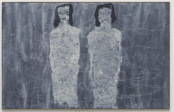Knocked back in love, fruitflies start knocking back the shots.
We've all done it. Researchers at University of California, San Fransisco studying the behaviour of drosophila fruit flies, have found that male fruit flies, when rejected by potential mates, turn to excessive alcohol consumption.
A group of scientists at the University of California, San Francisco (UCSF) has discovered that a tiny molecule in the fly’s brain called neuropeptide F governs this behavior. As the levels of the molecule change in their brains, the flies’ behavior changes too.
The new work may help shed light on the brain mechanisms that make social interaction rewarding for animals and those that underlie human addiction.
A similar human molecule, called neuropeptide Y, may likewise connect social triggers to behaviors like excessive drinking and drug abuse. Adjusting the levels of neuropeptide Y in people may alter their addictive behavior—which is exactly what the UCSF team observed in the fruit flies.
Clinical trials are underway, she added, to test whether delivery of neuropeptide Y can alleviate anxiety and other mood disorders as well as obesity.
The experiments started with male fruit flies placed in a container with either virgin female flies or female flies that had already mated.
virgin females readily mate and are receptive toward courting males, once they have mated, females flies lose their interest in sex
While virgin females readily mate and are receptive toward courting males, once they have mated, females flies lose their interest in sex for a time because of the influence of a substance known as sex peptide, which males inject along with sperm at the culmination of the encounter. This causes them to reject the advances of the male flies.
The rejected males then gave up trying to mate altogether. Even when placed in the same cage as virgin flies, they were not as keen to have sex. Their drinking behavior also changed.
When placed by themselves in a new container and presented with two straws, one containing plain food and the other containing food supplemented with 15 percent alcohol, the sexually rejected flies binged on the alcohol, drinking far more than their sexually satisfied cousins whose advances were never spurned.
the sexually rejected flies binged on the alcohol
The difference was not only apparent in their behavior. It was completely predicted by the levels of neuropeptide F in their brains.
“It’s a switch that represents the level of reward in the brain and translates it into reward-seeking behavior,” said Galit Shohat-Ophir, PhD, the first author of the new study.
The male flies that were paired with receptive virgin females from the start and successfully mated had lots of neuropeptide F in their brains and drank very little alcohol.
Rejected flies, on the other hand, had lower levels of neuropeptide F in their brains, and sought alternative rewards by drinking to intoxication.
Lowering the levels of the neuropeptide F receptor made flies that were completely sexually satisfied act as if they were rejected, inciting them to drink more.
Source: University of California, San Fransisco

The aim of art is to represent not the outward appearance of things, but their inward significance. – Aristotle













